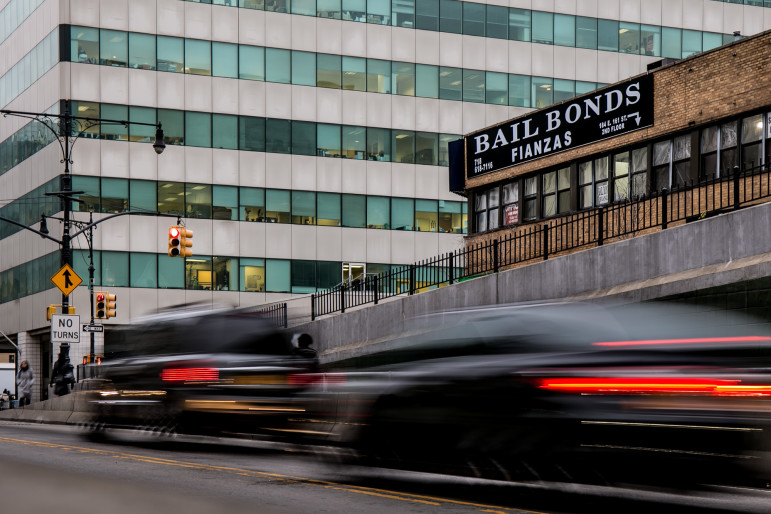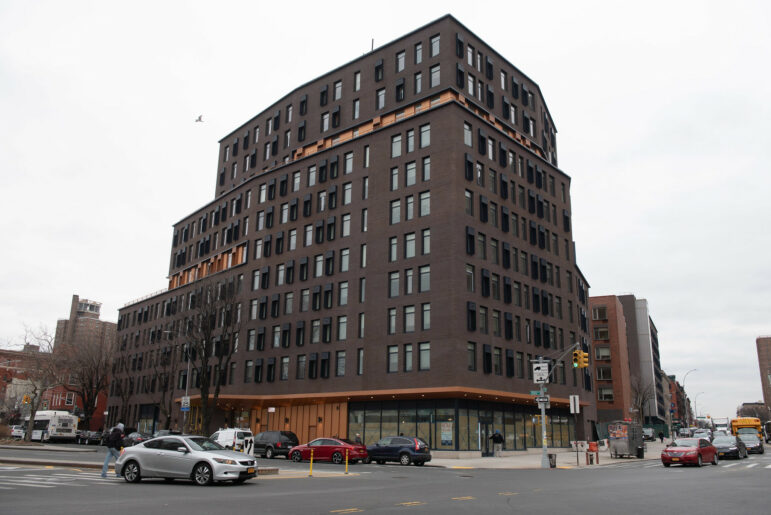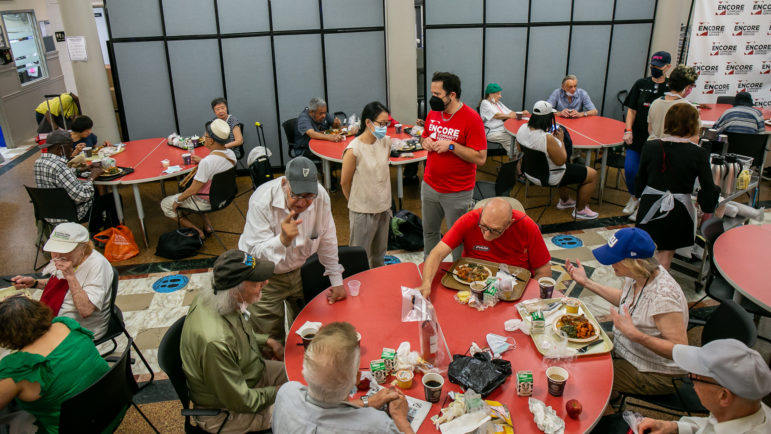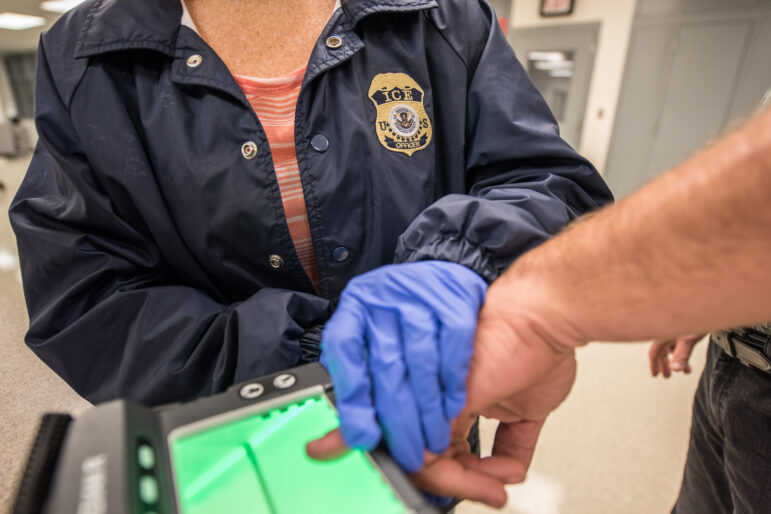
Adi Talwar
A bail business in the Bronx. Bail reform is at the top of the criminal-justice reform agenda, but advocates and officials could split over how ambitious the changes will be.
With a Democrat-controlled State Senate, Assembly and governorship in New York, reforming bail, requiring automatic discovery for defendants and implementing speedy trial laws appear to be the top priorities for both criminal-justice reform activists and policymakers in the upcoming term.
Bills addressing each of these things have been introduced in the Senate but have stalled without Republican support. Now, they each appear likely to pass since they have the support of a large number of senate Democrats including likely Majority Leader Andrea Stewart-Cousins as well as Governor Cuomo and versions of them have already passed the State Assembly as part of a large criminal-justice reform package earlier this year.
A number of criminal-justice reform advocates said they see the Democratic State Senate victory as an opportunity to enact legislation that dramatically transforms the criminal justice system.
“We’ve collectively created this really powerful political moment and are now poised to demand what it is that New Yorkers really need,” says Katie Schaffer, statewide organizer of the #FreeNewYork campaign at JustLeadershipUSA, whose goal it is to promote decarceration across New York state. “We go into this session with that understanding and with the wind at our backs.”
Bail reform, changing the discovery process and speedy trial laws have emerged as priorities throughout the 2018 year. They each would contribute to limiting the number of people entering the criminal justice system.
In New York State, a massive number of people are held in jail before or during trial simply because they cannot afford to pay the bail for their release—often even relatively small amounts for minor offenses. In 2016, three quarters of the city’s jail population was awaiting a verdict rather than convicted of a crime, and the vast majority of those detainees were held on bail. Bail reform could take many forms but generally, it would allow most or all defendants to be released before and during a trial.
New York is currently one of a handful states where prosecutors can wait until just before trial before sharing their evidence with defendants. This means that defendants must choose between a plea agreement or facing trial—one report says 95 percent of convictions in New York are secured by plea—without knowing what evidence prosecutors have against them. Discovery law reform would give defendants automatic access to all evidence prosecutors hold against them before having to make a plea, which could allowing them to better assess the potential of a trial.
Finally, a speedy trial bill known as “Kalief’s Law” (in honor of Kalief Browder, the young who spent three years at Rikers Island awaiting trial before his case was dismissed) would ensure that cases go to trial within a reasonable timeframe. Browder’s case was not unique: In New York City, it regularly takes months or years to reach a verdict. In 2016, it took 20.8 months on average, from initial arraignment to verdict.
“It’s a table with three legs and it’s important to get all three done, not just one,” says State Sen. Jamaal Bailey, who represents parts of the Bronx and Westchester and is a sponsor of the discovery reform and speedy trial bills in the Senate.
There might be a number of other bills on the horizon, too. As part of a large reform package, the state Assembly has passed bills restricting solitary confinement, expanding the use of treatment programs for substance-addicted defendants, creating a special prosecutor to investigate law-enforcement misconduct. There have also been proposals for comprehensive sentencing reform, to provide greater discretion to judges when sentencing defendants who are survivors of domestic violence and to reduce the maximum sentence for misdemeanors to 354 days, thus limiting potential immigration consequences for non-US citizens.
There are advocates pushing for each of these proposals in the state. For example, Victor Pate, who leads the Campaign for Alternatives to Isolated Confinement at the New York Foundation says, along with other advocacy organizations, he’ll be reaching out to Senate leadership in the coming months to advocate for reforms.
The governor has proposed his own changes, as well. They include changing rules for asset forfeiture in civil cases, limiting it only to cases in which a criminal conviction is obtained, and making a number of changes to improve the re-entry process. They include removing bans on occupational licensing for convicted felons, such as expanding merit release opportunities, measures to speed the release of aging people in prison, and eliminating parole supervision fees.
How aggressive will reform be?
“Now that we have a majority I think that we can think of ways to be even more forward thinking,” said Bailey.
Given the energy and range of proposals, it’s possible that Democratic lawmakers work to create a more comprehensive reform package or rethink the proposals currently in motion.
“What the Assembly passed last year shouldn’t be the starting point for what we can do this year,” says Schaffer. “We think that our electeds know that truly progressive legislation is possible. This is not a moment for us to have a conversation about political feasibility, about where do we compromise, but a moment to have a conversation about what we collectively need.”
“At the end of the day, we’re counting on the governor,” says Marie Ndiaye, who is a Supervising Attorney in the Decarceration Project at the Legal Aid Society. She’s confident, however, that Cuomo won’t be an obstacle. “We think that Governor Cuomo will be able to deliver. He’s made criminal justice reform a priority.”
There is a lot on Democratic lawmakers’ plates right now, from election reform to rent regulation to, potentially, single-payer healthcare. It’s not clear where criminal justice stands as an immediate priority. Reforms besides action on bail weren’t listed in the top possibilities in roundups by the Wall Street Journal, New York Times and Gothamist earlier this week.
Bailey says reforming the justice system is his top priority, but he wants to listen to the priorities and concerns of other Senate Democrats before making moves.
“My priority is to be a team player within the confines of my conference. I want to make sure that we as a conference are in lock step,” he says. “I’m excited about the new majority, but I want to make sure that people give us time and understand that Rome wasn’t built in a day. Exercise patience and trust us as we take the helm to make our state a better place,” he says.
With bail reform, for example, there is certainly going to be some disagreement. According to Schaffer, some of the bills that were introduced this year aren’t necessarily the best.
“The governor has committed to ending cash bail and that is an excellent starting point but it’s not enough,” says Schaffer. “We need to pass transformative legislation that not only ends money bail but does so in the context of a system that protects the presumption of innocence. That’s going to result in decarceration.”
JustLeadershipUSA has been critical of some 2018 bail proposals, saying they don’t eliminate bail uniformly, grant prosecutors too much discretion, and allow for the privatization of pretrial supervision and the expansion of electronic monitoring.
The ideal bail bill, according to Shaffer, ends money bail entirely, creates more robust due-process protection, doesn’t have carve-outs for particular charges and vastly limits the use of electronic monitoring. The Senate bill might fit that bill, and has received an endorsement from JustLeadershipUSA.
In 2019, Schaffer and her colleagues will be pushing for a bill with these principles in conversations with other advocates and elected officials.
Reform and Rikers
Bail, speedy trial and discovery reform each have the potential to facilitate the city’s plan to close Rikers Island, given their potential to reduce jail and prison populations. The city has said that it needs to reduce the jail’s population to less than 5,000 before closure and wants to do so within 10 years.
The population hovers somewhere around 8,100 currently and Brandon Holmes, who leads JustLeadershipUSA’s #CloseRikers campaign, says that the target population and timeline can both be reduced significantly. As advocates and legislators push for reforms at the state level, Holmes says #CloseRikers will be keeping significant pressure on the city.
“We know that this number can be below 5,000 based on the charges that people have brought against them,” he says. “We realistically believe it can be done sooner than [within 10 years] and if it’s not going to be done sooner than that, we want a stronger demand for long term deceleration.”
The city’s public comment period on its draft plan to replace Rikers with a borough-based jail system closed in late October and, according to a spokesperson for the Mayor’s Office of Criminal Justice, comments will be presented and responded to in a final plan that will be published in the coming months.
Double your impact. Support in-depth investigative journalism.
From now until December 31, NewsMatch will double gifts to City Limits. Your donation funds reporting that New York City needs.










One thought on “Agenda 2019: Eyes Are on Senate Democrats and 3 Key Criminal Justice Reforms”
I want to know more about this and when and if it is passed. Because my boyfriend needs to come home to help raise our son. It takes president over everything else. We live in upstate NY. And my boyfriend is in Fishkill. Is the reform for the entire state or just Rikers?